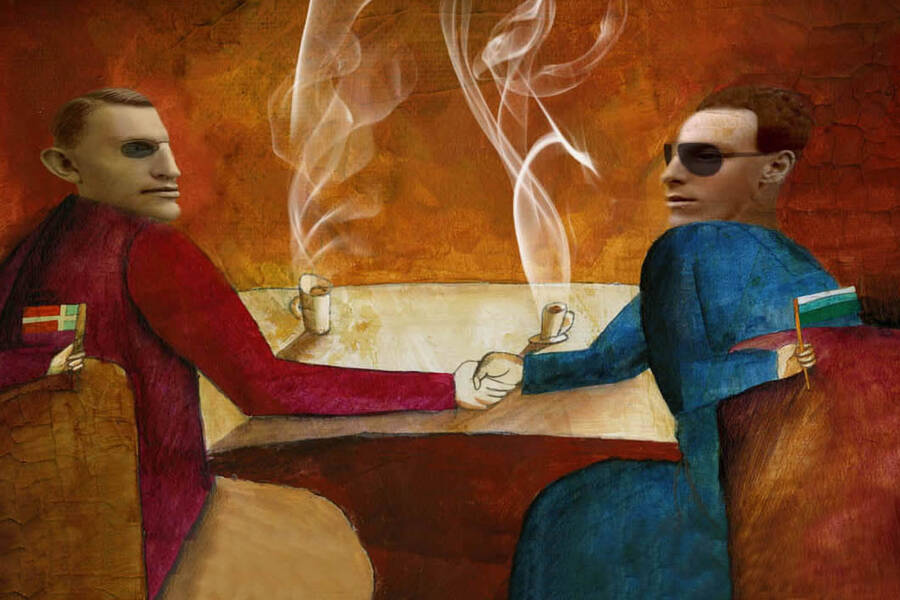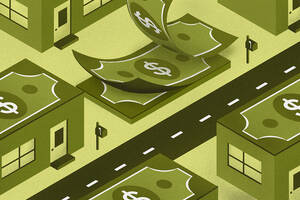Economics Finance & Accounting Sep 2, 2014
Is Economic Growth a Question of Culture?
A decade of research shows how culture seeps into economic decisions.

Yevgenia Nayberg
As some countries’ economies churn steadily—even briskly—over time, others’ remain stagnant. While standard economic variables, such as productivity and availability of capital, explain international differences, some of these differences remain unexplained. Gaps in economic development often seem to fall along cultural lines. “Culture and economics, they move together,” says Paola Sapienza, a professor of finance at the Kellogg School. But does culture follow economic development or is economic development directed by culture?
The debate goes all the way back to Karl Marx, who held the view that everything is driven by economics. Marx deemed religion, for instance, the opium of the people—imposed by, and to the benefit of, the economic establishment. But another view, held by Max Weber, gave culture more credence. Parts of Europe developed earlier and stronger than others, he posited, due to the influence of Protestant work ethics.
Who is right? Economists have traditionally taken the Marxian view, says Sapienza—at least until recently.
A Trip to Europe
Until just a few generations ago, living arrangements were very similar in Northern and Southern Europe. But more recently, the differences have become starker. In Southern Europe, children tend to live at home much longer than in Northern Europe. “This has enormous consequences,” explains Sapienza. “If they live at home until they’re forty, they have fewer children. We know that demographic growth is very, very important for economic growth, and so the question is: Why is there this big difference?”
The economic explanation, of course, is that, with unemployment high and real estate expensive in Southern Europe, kids simply cannot afford to move out. This is a “perfectly reasonable” explanation, says Sapienza, and proves that the economics “explains” cultural norms.
“Trust is quintessentially one of the most important ingredients in economic transactions.”
But there’s another possibility. The sexual revolution, which crashed through the Western world beginning in the 1960s, has changed the mores around children living at home. Before, the desire to enter into a serious relationship may have prodded more people out of the house at an early age. Now, it is no longer necessary to experience independence outside your parents’ home. Today, with no such pressure—as well as a free place to stay, complete with home-cooked meals and laundry service, at least in the nurturing family environment of Southern Europe—one wonders whether adult children even have a reason to leave the house. Culture may well be driving economic growth.
Taking Culture with You
Successfully disentangling the relationship between culture and economics has rested on one key truth: visitors to a new country inevitably bring some of their old cultural traditions with them. In 1997, for instance, a man and a woman left their 14-month-old child unattended outside of a New York City barbeque joint while they ate. Passersby noted the toddler crying in her stroller and called the police, who charged the parents with endangering the welfare of a child. The arrest raised a ruckus in the parents’ native Denmark, where it is commonplace to leave babies outside of restaurants and shops while parents go about their business.
Other habits—including more economically relevant ones, like a willingness to conform to rules—also travel across borders. In 2006, economist Ray Fisman tallied up the parking tickets given to United Nations diplomats. Because diplomats have diplomatic immunity and need never pay up, the only reason they would not park illegally is if they have internalized a cultural norm that tells them not to break the rules. Indeed, Fisman found that diplomats from highly corrupt countries tended to rack up more tickets than those from nations with low levels of corruption.
Economists have been able to exploit our tendency to take our culture with us by studying the economic habits of immigrants and their families. “In a way, with immigrants, you almost have a natural experiment,” says Sapienza. “It’s not perfect because, of course, immigrants self-select. But you have these people who are away from their environment.”
And just how they behave in a new country offers strong evidence that culture is often independent from economic context and may, in turn, play a causal role in shaping economics. Immigrants seem to keep the savings habits they’ve acquired in their old countries, for instance. And even their children tend to make labor and fertility choices that mirror those of children born in the country of origin. Indeed, in the study of living arrangements, UCLA economist Paola Giuliano showed that the sons and daughters of first-generation immigrants to the United States behave according to the geographical divide in Europe: southern European immigrants more frequently live at home with their parents, while those from northern Europe tend to live independently early on. This is remarkable because these immigrants are placed in the same economic context, yet their culture affects their decisions.
Trust and Economics
Acknowledging that cultural attitudes can influence economic decisions raises a question: Which attitudes? Over the years, the bulk of Sapienza’s own research has focused on trust. “My view has always been that trust is one variable that is highly cultural, often transmitted from parents to kids,” she says. “Think about the recommendation in some cultures not to trust anybody.” Growing up in an environment where you are told not to talk to strangers or rely on government officials sets you up to expect the worst from every encounter with a person or the state—and behave accordingly.
The economic implications of low trust can be vast. “Trust is quintessentially one of the most important ingredients in economic transactions,” says Sapienza. Sure, we can—and should—write contracts. But no contract will cover every contingency. “You have to trust the person you’re negotiating with that eventually we’re going to work together to work things out,” says Sapienza. “While trust is fundamental to all trade and investment, it is particularly important in financial markets, where people part with their money in exchange for promises.”
Trust levels differ wildly from one country to another. In Brazil, it is very low; in Northern European countries, it is much higher. And trust is strikingly persistent. This is partly just a common sense reaction to reality: if you live in a low-trust society, “it’s optimal for you to teach your kids not to trust,” says Sapienza, “because if you’re the only one trusting, you’re very likely going to be surprised by somebody taking advantage of you. In a culture where everyone is trusting, and there is therefore more cooperative behavior, the optimal thing to teach your kids is indeed to trust others. This transmission of cultural attitudes may have big economic consequences.”
Living without Trust
Sapienza has found that people tend to write fewer financial contracts in areas where the level of trust is lower. This unsurprisingly has a negative impact on economic development. “You have worse financial allocation,” says Sapienza, “because the quintessential mechanism of a free market economy is that people who have the capital are not necessarily the people who have the ideas. In order to put capital to use, you really have to make it circulate.”
Another of Sapienza’s studies finds that just how much citizens of one European country trust those of another impacts their willingness to engage in mutually beneficial financial transactions. Countries that do not share a national religion, have a history of war with each other, have fewer genetic similarities, or even simply possess negative stereotypes about each other are less likely to trade and invest in each other.
But trust does not just differ from nation to nation. In yet another study, Sapienza and her colleagues find that even within a state, individuals who are more trusting have riskier stock market portfolios: “People who believe that others can be trusted in general … end up putting their money to work,” says Sapienza, “investing in the stock market more, investing in riskier assets, and eventually having a higher return.”
Persistence of Growth
Sapienza believes that relatively high levels of trust in Northern Italy—and elsewhere in the world—stem from historical precedent. Back in the Middle Ages, many cities in Northern Italy, unlike many similar ones in the South, “rebelled against the Emperor and became free city states,” she explains. The undertaking required enormous cooperation among various parties and resulted in a much more open, transparent style of government. “What we claim in [a recent] paper is that this experience has led people to trust that they can change things,” says Sapienza. Today, Italian cities that became free city states over 800 years ago have more nonprofit organizations, engage in more blood and organ donation, and raise children less likely to cheat on their national exams than those that did not. That history begets culture is not an entirely new idea. Nathan Nunn, a professor at Harvard University, finds that even today low levels of trust in some regions of Africa align closely with regions where slave trade caused the most damage.
But perhaps history need not be destiny. Sapienza and other economists would like to find ways to increase trust levels in regions where they have historically been low—particularly in places where barriers to economic development, such as legalized discrimination, have since been removed. But change will not come easily. “Where do we start?” Sapienza asks. “If you don’t trust anybody, you will not engage in transactions and, of course, the system will not reward you, even when institutional changes have removed discrimination. More importantly, if you don’t trust, you’re going to teach your kids not to trust, which creates a cycle that is difficult to escape.”



